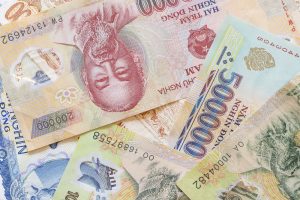Vietnam has reached an agreement with the United States over charges of currency manipulation, pledging to refrain from the “competitive devaluation” of its dong currency in order to gain an export advantage.
The agreement was announced in a joint statement by Treasury Secretary Janet Yellen and Nguyen Thi Hong, the governor of the State Bank of Vietnam (SBV), after a virtual meeting yesterday. The U.S. Treasury Department and the SBV have had “constructive discussions” in recent months, the statement said, and reached an agreement that addressed the former’s concerns about Vietnam’s currency practices.
“I believe the State Bank of Vietnam’s attention to these issues over time not only will address Treasury’s concerns, but also will support the further development of Vietnam’s financial markets and enhance its macroeconomic and financial resilience,” Yellen said in the statement.
Vietnam came under growing U.S. pressure under the Trump administration, which lashed the country over its currency practices and ballooning trade surplus with the U.S., threatening to impose punitive tariffs on imports from Vietnam.
In its semi-annual report to Congress in December, the U.S. Treasury Department officially labeled Vietnam a currency manipulator, claiming that it “conducted large-scale and protracted intervention, much more than in previous periods, to prevent appreciation of the dong.”
In April of this year, the Treasury Department removed the “currency manipulator” label from Vietnam but said that Vietnam, along with Taiwan and Switzerland, had exceeded its thresholds for the designation under a 2015 law. The department at the time said it would commence “enhanced engagement” with Hanoi to correct the situation, which led to the current resolution.
Consistent with the often self-defeating nature of Trump-era foreign policy, the probe into Vietnam’s currency policies seemed destined to complicate U.S. relations with an important Asian partner. In recent years, Washington and Hanoi have seen a steady strategic convergence, due to their common concern about Chinese assertiveness in the region, from the upper Mekong River to the South China Sea.
Washington’s claims overlooked the fact that much of Vietnam’s trade surplus with the U.S. was a by-product of another Trump administration policy: the tariff war with China that saw supply chains relocate to Vietnam. According to Reuters, Vietnam’s goods trade surplus with the U.S. jumped 25 percent in 2020 to $69.7 billion, despite the COVID-19 pandemic.
Vietnam denied the charges of currency manipulation, with then-Prime Minister Nguyen Xuan Phuc arguing in October last year that the nation’s exchange rate policy was not aimed at boosting Vietnam’s exports and asking that Trump come to “a more objective assessment of the reality in Vietnam.”
In yesterday’s joint statement, Vietnam confirmed its commitment under International Monetary Fund rules “to avoid manipulating its exchange rate in order to prevent effective balance of payments adjustment or to gain an unfair competitive advantage” and promised to “refrain from any competitive devaluation of the Vietnamese dong.” The SBV said the focus of its monetary policy framework is “to promote macroeconomic stability and to control inflation.”
U.S. Trade Representative Katherine Tai said that her office will monitor Vietnam’s implementation of the agreement and would work with Vietnam “to ensure that it addresses the acts, policies and practices related to the valuation of its currency that were found actionable in the Section 301 investigation.”
In October, Tai’s predecessor also opened an investigation into possible currency manipulation by Vietnam, later ruling that it was taking “unreasonable” actions to push down the value of its currency to make its exports cheaper. However, the agency held off on imposing tariffs on Hanoi.
While the agreement stops short of an acknowledgment by Vietnam that it was engaging in currency manipulation to benefit its exports, this agreement seems set to put the issue to rest, allowing the two nations to focus their attentions on questions of mutual concern.

































